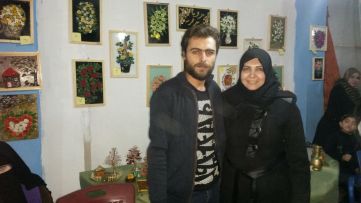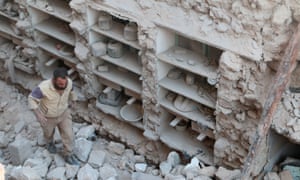
'I am Ghalia Rahal, the mother of the martyr, Khaled al-Issa. Khaled was among the first revolutionaries to take part in the peaceful demonstrations in Kafr Nabel from the very beginning in Syria. Until the very last, he never deviated from the revolution because he believed strongly in its ideals and in his country. He defended the people who were being killed by the Syrian regime and Russian aerial bombardments and the injustice and oppression of the regime in Syria.
Khaled believed deeply in Syrians’ aspirations and he would tell me: “My Mother, from the very first day that I began taking part in the protests, I considered myself as ready to die for the revolution. I’m going to work for the people – because I’m sure that after all the sacrifices we have made, there will be results. And even if we cannot see the results ourselves, the children who follow us will be able to see the results one day. ”
Khaled used to go to Aleppo a lot to document the crimes going on there. The last time I talked with him he told me there were so many people in Aleppo who were being targeted and bombed and yet there were not many journalists in Aleppo. That’s why he wanted to go there – to document the crimes that were actually taking place. By taking photos with his camera, he could photograph cases of massive violations of human rights taking place in Aleppo. The last thing he told me was thousands of journalists and photographers were needed to cover the crimes that were occurring in Aleppo.
He used to tell me: My Mother, you should continue working with women so that they can learn resistance during the war and prepare the following generations with an education, where criminality, murders and destruction no longer exist and so that peace reigns. He used to say: My Mother, if I am there or not, you must continue your work and I will continue mine too. That is why I will continue my work. Khaled’s spirit is with me constantly and I will continue even if there is no physical presence, because his spirit will always be with me. Firstly, as a Syrian citizen and secondly, as the mother of the martyr Khaled al-Issa and as one of those who participated in the Syrian revolution from its earliest days, and with the help of God, we will continue until our very last breath.
Even if we have lost those who are dearest to us, we will be stronger and will continue for our children. We will carry on for the following generations; for freedom and dignity and even though, as I told you, the price is dear. Yet despite this price we will carry on. We say no to tyrants, no to the unfaithful, no to destruction, no to assassinations. We live for peace alone. Our sacrifices will be for peace and nothing else.'
